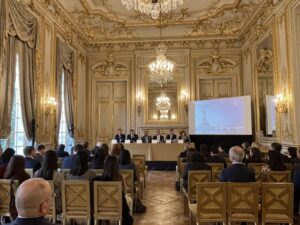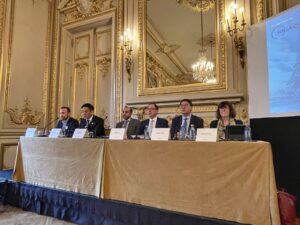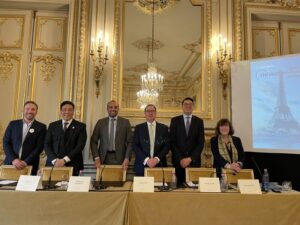In 2022, Hong Kong International Arbitration Centre’s (HKIAC) arbitration caseload reached its highest level in over a decade. The statistics demonstrate the steady strength of Hong Kong (“HK”) as a seat for arbitration. As the global economy turns towards Asia, increased commercial and investment activity will lead to increased disputes and demand for effective dispute resolution. In this context, Gaillard Banifatemi Shelbaya Disputes organized on Day 4 of the Paris Arbitration Week (PAW) a breakfast seminar entitled “Spotlight on Hong Kong: Innovations in International Arbitration”. The panel, composed of Eric NG (HKIAC), Benjamin Siino(Gaillard Banifatemi Shelbaya Disputes), Mohamed Shelbaya (Gaillard Banifatemi Shelbaya Disputes), Kim Rooney (Arbitrator), Robert Pe (Arbitration Chambers), and Wesley Pang (Eversheds Sutherland), provided a practical overview of recent developments in HK’s pro-arbitration landscape and how the HKIAC has adapted to provide unique advantages in the current arbitration market, as summarized below.
Development of the Regulatory Framework on Third-Party Funding
Addressing first the hot topic of third-party funding (“TPF”), Kim Rooney introduced two key legislative reforms: first, the inclusion in 2019 of a provision expressly allowing TPF in arbitration, and second, a reform adopted in December 2022 allowing lawyers to charge outcome-related fees.
 Separate from Mainland China’s civil law system, HK is a common law jurisdiction. Its “Arbitration Ordinance” is based on the UNCITRAL Model Law. Although HK’s legal profession is divided between solicitors and barristers, arbitration enjoys an open regime with party representatives not having to be legally qualified. HK’s system includes over 700 common law doctrines of champerty, maintenance and barratry, unless expressly excluded. Before the reform, the effect of these doctrines was that third parties to proceedings were prohibited from funding or profiting from contentious proceedings, in which they did not have an interest recognized by law. These doctrines still apply to litigation in HK, save for enforcement proceedings under the Arbitration Ordinance. The reforms were drafted with reference to these concepts and doctrines and allow funding, whether by third-party funders or arbitration lawyers, for emergency arbitrator proceedings, mediation and enforcement proceedings in courts under the Arbitration Ordinance.
Separate from Mainland China’s civil law system, HK is a common law jurisdiction. Its “Arbitration Ordinance” is based on the UNCITRAL Model Law. Although HK’s legal profession is divided between solicitors and barristers, arbitration enjoys an open regime with party representatives not having to be legally qualified. HK’s system includes over 700 common law doctrines of champerty, maintenance and barratry, unless expressly excluded. Before the reform, the effect of these doctrines was that third parties to proceedings were prohibited from funding or profiting from contentious proceedings, in which they did not have an interest recognized by law. These doctrines still apply to litigation in HK, save for enforcement proceedings under the Arbitration Ordinance. The reforms were drafted with reference to these concepts and doctrines and allow funding, whether by third-party funders or arbitration lawyers, for emergency arbitrator proceedings, mediation and enforcement proceedings in courts under the Arbitration Ordinance.
It was decided, adopting a “light-touch” regulatory approach, that there should be a Code of Practice applying to all third-party funders who fund arbitrations “taking place” in HK. This Code of Practice sets out that (i) there must be the informed consent of the funded party, and (ii) the funder has to satisfy capital adequacy requirements. Further, the TPF agreement shall include provisions on:
- the management of conflict of interests;
- control by the party notwithstanding TPF;
- confidentiality (the Arbitration Ordinance itself also provides that arbitration is a confidential process not just in arbitration proceedings but also in courts);
- mandatory disclosure of TPF;
- clear grounds for termination of a TPF agreement, etc.
Types of Outcome-Related Fee Structures
As described by Ms. Rooney, the reform considered both contingency and success fees. This raised concerns about lawyers now having the potential to commercially benefit from proceedings in addition to getting paid fees. This is one of the reasons why the reforms are limited to arbitration and related proceedings – to see whether or not these reforms should be extended to litigation.
Lawyers may now enter in three types of outcome-related fee structures for arbitrations:
- Conditional fee agreement, under which a lawyer is paid a success fee, and the reference point is the amount of “benchmark” fees that would otherwise be charged. The fees are paid only in the event of a successful outcome, as agreed with a client, and are capped at 100% of the “benchmark” fees. This permits both “no win, no fee agreements” or “no win, low fee” agreements”;
- Damages-based agreement/contingency fee agreement, under which a lawyer receives payment only if a client obtains a financial benefit in the matter (a “financial benefit” is defined in the Arbitration Ordinance). The fee is capped at 50% of the financial benefit obtained by the client;
- Hybrid damages-based agreement, the lawyer receives payment only if the client receives a financial benefit. In this setting, fees are capped at 50%, but the client also agrees to pay the lawyer’s fees, which are typically discounted.
Following these reforms, parties have been increasingly availing themselves of TPF. In situations where the case does not succeed, it is anticipated that there will be a need for after-the-event insurance. Ms. Rooney concluded by saying that it is now possible to have arbitration funding in HK, whether by third-party funders or by lawyers, and there is a fairly clear regime in each case.

Eric NG added that in 2022 the HKIAC saw a significant rise in funder disputes. The recurring issue is whether there will be any assets to enforce the award against. Over the last decade, there has been an increase in the use of interim measures to help to preserve assets. The problem for those dealing with parties in China is that domestic courts will not recognize interim measures which are ordered by an arbitral tribunal seated outside Mainland China.
This situation began to change in October 2019, when HK entered into the Arrangement Concerning Mutual Assistance in Court-ordered Interim Measures in Aid of Arbitral Proceedings by the Courts of the Mainland and of the Hong Kong Special Administrative Region. HK thus became the first seat outside Mainland China where a HK-seated arbitral tribunal could have parties go to a Mainland Chinese court to seek interim measures.
Applying for interim measures before Mainland Chinese courts requires the arbitration to, first, be seated in HK, and second, be administered by a HK-qualified arbitral institution, including the HKIAC. As of March 2023, the HKIAC has received 91 applications for letters of acceptance confirming arbitrations from parties involved in arbitrations with the HKIAC: 86 of them were for asset preservation orders, two were for evidence preservation orders, and three were for conduct preservation orders. The total amount requested was about 3.5 billion USD.
Enforceability of Arbitral Awards
Looking at the enforceability of arbitral awards in HK, Benjamin Siino explained that over the past years HK courts have adopted a clear pro-enforcement approach. In a 1994 decision, the HK High Court found that HK courts enjoy discretion to recognize awards even when grounds under Article 5 of the New York Convention are fulfilled. This is also seen in recent cases. In Dana Shipping & Trading v. Sino Channel Asia, irrespective of the fact that the award was set aside, the court decided that it should exercise its discretion to look at the award in itself and decide by itself, according to its own interpretation, whether the award is to be recognized.
The second important aspect is that HK courts recognize and enforce interim or emergency arbitration awards, which remains controversial in numerous jurisdictions (especially in France and in the United States).
This issue is expressly regulated under HK law. According to Section 22.B of the Arbitration Ordinance:
“[a]ny emergency relief granted, whether in or outside Hong Kong, by an emergency arbitrator under the relevant arbitration rules is enforceable in the same manner as an order or direction of the Court that has the same effect, but only with the leave of the Court”.
A similar provision exists concerning interim measures (Section 61). In terms of efficiency, the fact that interim measures or emergency arbitrator awards are temporary in nature should not preclude them from being enforced. This is one of the biggest advantages of having a seat or bringing enforcement proceedings in HK.
There is also a concurrent jurisdiction between arbitral tribunals and domestic courts for granting interim measures in the course of arbitration proceedings. The court may decline to exercise its power if an interim award sought is subject to arbitral proceedings. This possibility should not be seen in a negative way, since it is used in a restrictive manner. In accordance with the “Supplemental Arrangement Concerning Mutual Enforcement of Arbitral Awards between the Mainland and the Hong Kong Special Administrative Region” signed in 2020, there is a mutual enforcement of awards between Hong Kong and Mainland China.

Robert Pe highlighted HK’s competitive advantages, with courts being very supportive towards arbitration. Arbitration matters are referred to a specialist judge who has an arbitration background. Further, in the Court of Final Appeal, there are ten retired foreign-trained judges, which is not a common feature in other jurisdictions. This counterbalances any kind of political pressure or anything else that could happen in the legal process.
Mr. Pe also emphasized the overall attractiveness of the HKIAC and HK, including a transparent fee scheme, premier hearing facilities, outstanding tribunal secretary service with reasonable fees, a law based on UNCITRAL Model Law 2006, a wide range of interim measures available, complete protection on confidentiality, and an opting mechanism to appeal awards based on questions of law. He added that none of his awards were appealed on questions of law as parties in HK understand and accept that one of the key values of arbitration is finality.
New Types of Disputes Referred to the HKIAC
The panel then examined the trends in the new types of disputes referred to the HKIAC.
With regard to digital asset disputes, Wesley Pang observed that those actually referred to the HKIAC may go back to a year ago, when there was a major drop in crypto markets in May 2021. HK is a strong international financial center, which explains why there are many disputes related to the financial sector. The uniqueness now is the rise in digital assets being the underlying assets in relation to these disputes. The other area of crypto related disputes is an area related to constructs in the metaverse. This virgin area raises questions on how disputes are to be resolved in the metaverse in terms of enforceability, jurisdiction and issues regarding privity of contract. There are a lot of features in the HKIAC Rules that make arbitrations cost-effective and time-efficient and that let arbitrators deal effectively with multi-contract and multi-party disputes.
Mr. Pang added that HK remains a suitable seat for resolving China-related disputes as it is less subject to political risks. Mohamed Shelbaya confirmed that the same holds true with Russian-related parties. Universal seats, such as London, Paris, Geneva, and perhaps the Hague, suddenly become less appealing due to political considerations, traveling restrictions, and regulatory sanctions. Some institutions like the HKIAC benefit from being in a jurisdiction with no sanctions, while others like the LCIA have obtained exemptions allowing them to administer disputes affected by sanctions.
Mr. Shelbaya emphasized that the reality check concerns money. The HKIAC has a policy of allowing payment in different currencies if there is an issue with sanctions, but this is not always the case with other institutions. When it comes to the seat, choosing a neutral seat is one of the solutions to avoid complications in relation to sanctions. However, there is a question of how long will the law of the currently neutral seat resist the temptation of recognizing those sanctions according to the local perception of international public policy.
________________________
To make sure you do not miss out on regular updates from the Kluwer Arbitration Blog, please subscribe here. To submit a proposal for a blog post, please consult our Editorial Guidelines.


